Big Ideas, Better Cities: The “critical” role of research in city-building
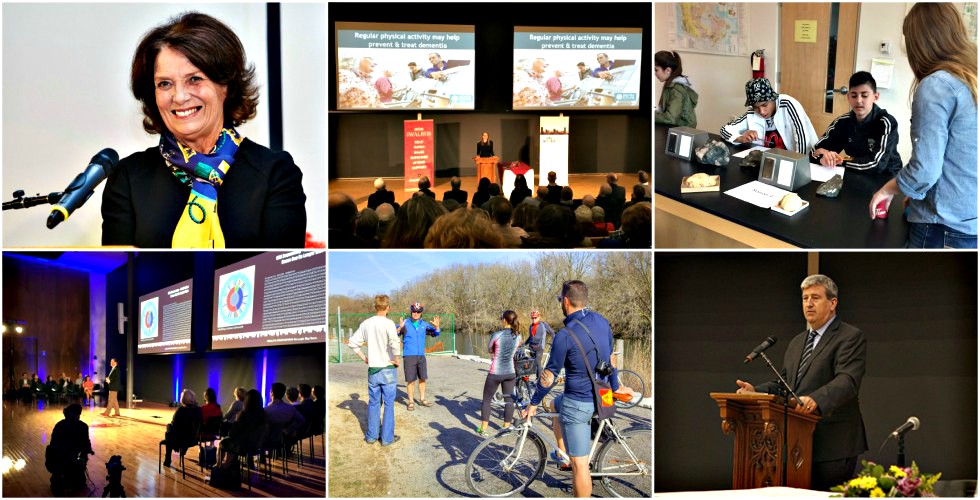
BY Erica Balch
November 23, 2016
How can McMaster researchers and students help address some of the most pressing issues facing cities today?
That was the focus of Big Ideas, Better Cities, a series of public events that took place between September 2015 and April 2016 aimed at connecting the University to the Hamilton community and showcasing how McMaster research is helping cities respond to 21st century challenges.
“We wanted to build better bridges between the McMaster and Hamilton communities and both listen to their concerns and shine a light on how research can positively impact cities here in Ontario and around the world,” says Susan Searls Giroux, Associate Vice-President, Faculty, who led the initiative. “Our goal was to deepen and expand dialogue within our community, to learn more about the challenges facing cities, and to share the ways in which McMaster’s cutting-edge, interdisciplinary research can help address these challenges.”
Funded through Forward with Integrity– an initiative intended to enhance the University’s programs and activities in core areas including research excellence and McMaster’s relationship with the community– Big Ideas, Better Cities featured themes that focused on four areas of research strength including healthy aging, big data, healthy communities, and research related to climate change and the environment.
Big Ideas, Better Cities events, which took place both on campus and at locations across Hamilton, drew nearly 3000 community members and involved about 200 McMaster researchers campus-wide. Each theme included a series of events that were organized by a team of interdisciplinary researchers and included consultation within the University community and with City of Hamilton officials.
Each set of events was distinct and featured a range of activities including high profile public talks, conferences and community workshops, as well as tours and demonstrations in 17 diverse labs and research spaces across campus.
Stephen Huddart, CEO of the McConnell Family Foundation, kicked off the Big Ideas, Better Cities series with his talk, How Universities can Make Cities Great, in which he discussed the many challenges facing both cities and post-secondary institutions, and how renewed city/university collaboration can generate prosperity and social progress.
Watch video of Stephen Huddard’s talk
This talk set the stage for Big Ideas, Better Cities series, which included the following themes:
Theme 1: Healthy Aging
Living long, Living well: A Symposium on the Plasticity of Aging, led by Parminder Raina, Director of the McMaster Institute for Research on Aging, and the Raymond and Margaret Labarge Chair in Research and

Knowledge Application for Optimal Aging, explored the latest research on optimal aging and included a two-day academic symposium highlighting the leading-edge research of more than 60 renowned McMaster and international experts.
As part of this event, Margaret Trudeau gave a public talk recounting her struggles with mental health and sharing insights from her book The Time of your Life, on how older adults can make their later years meaningful and fulfilling.
Read Hamilton Spectator Article, “All Grown: Margaret Trudeau”
Read Daily News article: Margaret Trudeau: “Be curious and full of wonder”
Theme 2: Health and Social Innovation through Big Data
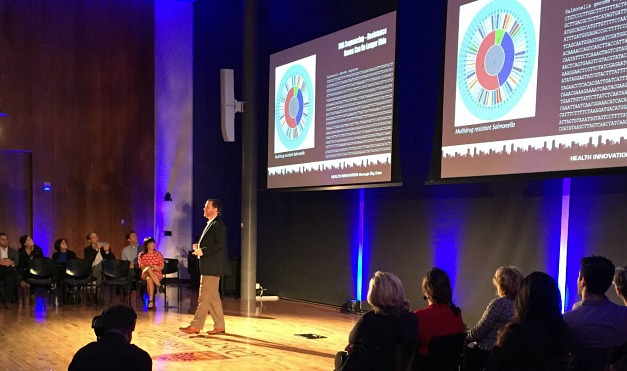
More than 300 members of the Hamilton and McMaster communities gathered over two evenings for Health and Social Innovation through Big Data, which focused on how
McMaster researchers are using big data to transform health care and drive creative solutions to some of the complex challenges facing cities today.
John Preston Associate Dean, Research and External Relations in the Faculty of Engineering and Abigail Payne, Director of McMaster’s MacDATA Institute were the lead organizers of this event, which included presentations by community leaders, industry partners, students and McMaster researchers.
Watch videos: Big Data researchers at McMaster
Read Hamilton Spectator article: “‘Big Data’ in action can help health care”
Read Daily News article: “How ‘Big Data’ can help solve big problems
MacTalks
Throughout the event, McMaster experts from a number of Faculties delivered a series of 10-minute mini-lectures, or MacTalks, on topics ranging from how big data is being used to combat antibiotic resistance to how data is helping to reshape the urban landscape and build sustainable societies.
MacTalks included:
When Big Data Meets Health: The Advent of Precision Medicine
Guillaume Paré, MD & PhD, Department of Pathology and Molecular Medicine Director of the Genetic and Molecular Epidemiology Laboratory. Watch video
Combatting Antibiotic Resistance Using Surveillance
Andrew G. McArthur, PhD, Department of Biochemistry & Biomedical Sciences Cisco Research Chair in Bioinformatics. Watch video
Big Data, Big Ideas: The Role of Theory in a Data-Rich World
John Cairney, PhD, Departments of Family Medicine, Kinesiology, Psychiatry and Behavioural Neurosciences Director of the INCH Lab. Watch video
Using Big Data to Transform Healthcare for Elders
Andrew Costa, PhD, Department of Clinical Epidemiology & Biostatistics Schlegel Chair in Clinical Epidemiology & Aging. Watch video
Partnering for the Public Good
Abigail Payne, PhD, Department of Economics Director of MacDATA Institute Director of the Public Economics Data Analysis Laboratory (PEDAL). Watch video
Building Dance Technologies for People with Parkinson’s
Matthew Woolhouse, PhD, School of the Arts. Watch video
The City as a Complex System and Evidence Based Planning
Pavlos Kanaroglou, PhD, School of Geography and Earth Science Director of the McMaster Institute for Transportation and Logistics. Watch video
Soap Box Talks
During each event, MacTalks were followed by informal ‘soapbox talks’ by community leaders, students, industry partners and McMaster researchers on the different ways in which big data is influencing public policy and fuelling social and health innovation.
Watch Soapbox Talk by Hamilton City Manager, Chris Murray:
Watch video of all Soapbox Talks
Hack your Community
Health and Social Innovation through Big Data also included a student-focused event called Hack your Community, organized in partnership with The Forge, Hamilton’s startup incubator and McMaster’s on-campus entrepreneurship initiative.
Using a collection of data provided by the Community Foundations of Canada (CFC), and with the help of peers and community mentors, McMaster students worked in teams, over 24 hours, to come up with projects or ideas that could make a difference in the Hamilton community.
Watch video on Hack your Community:
Theme 3: Building Healthy Communities
Building Healthy Communities was made up of four days of events showcasing how McMaster researchers are helping to build healthy cities in Hamilton and around the world.
Read Jennier Heisz’s OpEd, “A person with Alzheimer’s is still here”
Read Kathy Georgiades’ OpEd, “How we can create welcoming environments for refugees”
Read Hamilton Spectator article, “how to make Hamilton healthier, smarter and more creative”
Read Daily News article, “Big ideas, healthier neighbourhoods”
Jim Dunn, Chair of McMaster’s Department of Health, Aging & Society and Nick Kates, Chair and Professor in the Department of Psychiatry and Behavioural Neurosciences, co-led the Building Healthy Communities events which drew more than 800 faculty, staff, students and community members for a range of events including:
Healthy Active Living: Behind the Slogan
Hosted by McMaster Children and Youth University (MCYU), more than 300 children and their parents or guardians joined Dr. Katherine Morrison, Associate Professor in the McMaster’s Department of Pediatrics, for a talk on what’s new in the science behind childhood obesity. This talk was followed by interactive workshops on health, technology and social issues of concern in many neighbourhoods around the greater Hamilton area.
This even coincided with a community celebration and cake cutting ceremony with Hamilton Mayor Fred Eisenberger in honour of MCYU’s fifth anniversary of service to young people and their families from across Southern Ontario.
MCYU offers free, monthly Saturday morning lectures for young students (7-14 years old), to spark their curiosity and expose them to the university environment.
Half-day Conference: Healthy Children and Families

Left to right: Cheryl Missiuna, Jean Clinton, Harriet MacMillan, Marissa Young, Kathy Georgiades
This conference highlighted the work of five McMaster researchers, who are working with community partners to make Hamilton the best place to raise a child. This event also included a panel discussion featuring Paul Johnson, Director LRT Project Coordination, City of Hamilton, Howard Elliott, Managing Editor, The Hamilton Spectator and Filomena Tassi, MP, Hamilton West-Ancaster-Dundas
Talks included:
Partnering for Change: Improving the Lives of School-aged Children in Hamilton: Cheryl Missiuna, PhD, OTReg(Ont), Professor in the School of Rehabilitation Sciences at McMaster University
Healthy Child Development: Jean Clinton, BMus MD FRCP(C), Clinical Professor McMaster University, Dept of Psychiatry and Behavioural Neuroscience
Preventing Family Violence: Building Healthy Families: Harriet MacMillan, MD, MSc, FRCPC, Professor, Departments of Psychiatry and Behavioural Neurosciences, and of Pediatrics, Chedoke Health Chair in Child Psychiatry, Offord Centre for Child Studies, McMaster University and McMaster Children’s Hospital
Neighbourhood Influences on Parents’ Work-Family Conflict and the Implications for Child Health and Well-Being: Dr. Marisa Young, Assistant Professor, Department of Sociology, McMaster University
Mental Health and Academic Outcomes of Migrant Children in Hamilton: Kathy Georgiades, PhD, Associate Professor & David R. (Dan) Offord Chair in Child Studies, Department of Psychiatry and Behavioral Neurosciences & Offord Centre for Child Studies
The McMaster Health Crawl
McMaster researchers gave demonstrations and guided tours of six unique labs and research spaces on campus, inviting both the Hamilton and McMaster communities to learn more about the research currently underway.
The Biomechanics Lab, the LiveLab, the Centre for Simulation-based Learning, the CRUNCH Lab, the Student Wellness Centre (SWELL) and the PACE Lab were open to the public.
Watch video featuring these research spaces:
Walrus Talks
Walrus Talks, produced in partnership with McMaster and the Walrus Foundation, included a unique line-up of creative, cultural, civic, community and McMaster experts who spoke about some of the critical factors in building healthy cities.
Walrus Talks included:
Activating Space
Santee Smith, Kaha:wi Dance Theatre. Watch video:
Good Stories Make Good Neighbours
Miranda Hill, Project Bookmark. Watch video:
Loneliness is the Greatest Poverty
André Picard, Globe and Mail. Watch video
Breaking Down Stigma
Jennifer Heisz, Associate director (seniors) of the Physical Activity Centre of Excellence (PACE). Watch video
The Odd Interplay of Cities and Infection
Gerry Wright, Director of the Michael G. DeGroote Institute for Infectious Disease Research. Watch video
Health Happens When You Fight for It
Nick Saul, Community Food Centres Canada. Watch video
Creating Culture
Tim Potocic, Supercrawl. Watch Video
The McMaster Health Fair
More than 120 researchers representing over 30 research groups, and community organizations that work with McMaster researchers, took part in this event, which highlighted the research taking place to help build healthier communities in Canada and around the world. Through presentations, posters, and table displays, McMaster researchers and community organizations had the opportunity to share their work with the public and showcase the many projects, research facilities, courses and initiatives that contribute to building healthy communities.
This event took place directly preceding the Walrus Talks, providing attendees with the opportunity to learn more about McMaster’s efforts to support healthy communities through research.
Theme 4: Climate Change and Environment
900 members of the Hamilton and McMaster communities attended Climate Change and Environment: Navigating from Risk to Resiliencefive days of conferences, talks and activities that explored how research can help cities respond to the threat of climate change and help build greener, more sustainable communities.
These events were co-led by Carolyn Eyles, director of the Integrated Science Program and a professor in the School of Geography & Earth Sciences and Dustin Garrick, assistant professor (Department of Political Science and the Booth School of Engineering Practice) and the Philomathia professor in water policy.
The Spring Water Forum
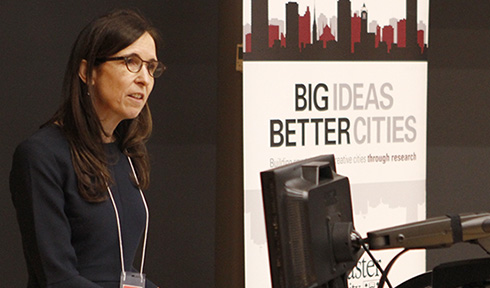
The Spring Water Forum, hosted by the McMaster Water Network, featured a number of sessions with McMaster and international experts on some of the most pressing water-related challenges facing cities today and explored how the latest research is helping communities develop paths to urban water security.
Speakers included Yanna Lambrinidou (Virginia Tech) who shared insights from the prize-winning Virginia Tech research team that uncovered the drinking water crisis in Flint Michigan, Patrick Ray, Research Assistant Professor, Department of Civil and Environmental Engineering at the University of Massachusetts and consultant with the World Bank who spoke about the effects of climate change on water resource planning and Bu Lam, Manager of Municipal Programs at the Canadian Water Network on the challenge of water security in cities.
Read Daily News article, “Water expert: ‘Citizens can save their own day'”
The event also featured McMaster water researchers, Dustin Garrick, Philomathia Professor in Water Policy and Director of the McMaster Water Network, Gail Kranztberg, Professor and Director of the Centre for Engineering and Public Policy in the W. Booth School of Engineering Practice and Sarah Dickson, Associate Professor in McMaster’s Department of Civil Engineering.
Low Carbon Cities Conference
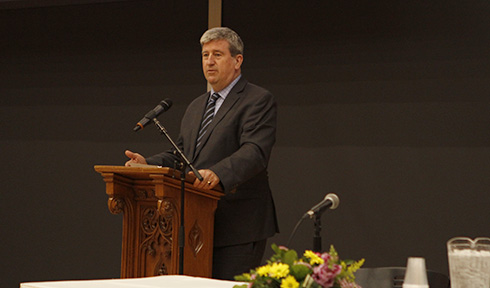
Low Carbon, Climate Resilient Cities brought together leading researchers, municipal leaders, the businesses community, non-governmental organizations and members of government to exchange ideas and build collaborations focused on transforming cities into smart, low carbon communities.
The event, organized by Altaf Arain, Director of the McMaster Centre for Climate Change, featured a number of speakers including The Honourable Glen Murray, Minister of the Environment and Climate Change, the Honourable Eleanor McMahon, M.P.P for Burlington and Founder of the Share the Road Cycling Coalition, Glen Hodgson, Vice-President & Chief Economist at the Conference Board of Canada, and Chris Murray, city manager at the City of Hamilton.
Read Daily News article, “Glen Murray: ‘A serious conversation’ needed on climate change
A number of McMaster researchers participated in the conference including Pavlos Kanaroglou, director of the McMaster Institute for Transportation and Logistics, James Cotton, professor and associate director of the McMaster Institute for Energy Studies and Bruce Newbold, professor and director of McMaster’s School of Geography and Earth Sciences.
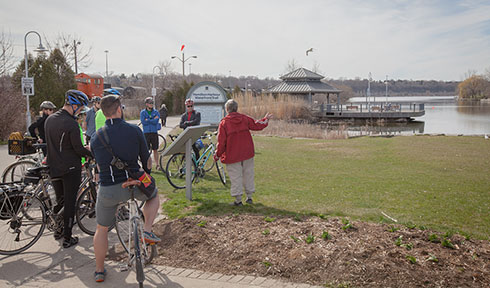
The Hamilton Bike Tour: The Rolling Green Seminar
50 cyclists– a mix of students, professors, staff and community members– gathered to explore some of the environmentally significant sites across Hamilton and learn more about the initiatives currently underway to help preserve and restore Hamilton’s natural environment.
Participants heard from a number of community, municipal leaders and McMaster experts including Matthew Green, Ward 3 Councilor, Carlos Pinho, Beautiful Alleys, Mark Chamberlain, President and COE, Trivaris Ltd., Randy Kay, Ontario Public Interest Research Group (OPIRG), McMaster, Nancy Bouchier, Associate Professor, Department of History, Daryl Bender, Transportation Planner, City of Hamilton, Reyna Matties, Graduate Students Department of Biology and Brian Baetz, Professor and Chair, Department of Civil Engineering.
Michael Egan, Associate Professor of History in the Faculty of Humanities organized the event, which started at Tim Horton’s Field and made a number of stops including selected sites in East Hamilton, the Hamilton Bayfront, Lot M (an environmental restoration site on McMaster’s campus), and the Dundas EcoPark.
Electric Mobility Conference
The Critical Role for Electric Mobility, hosted by the McMaster Institute for Transportation and Logistics (MITL), brought together McMaster, national and international experts to explore how electric vehicles are poised to transform our everyday lives, impact our economic activities and help re-shape our cities locally and around the world.
Read Daily News Article, “Demand for electric vehicles will increase if the price is right”
Speakers included Jillian Anable, Professor and Chair in Transport and Energy, University of Leeds, Julian Marshall, Professor, Environmental Engineering, University of Washington, Dan Guatto, Chief Operating Officer, Vice President, Engineering and Opeations, Burlington Hydro Inc., Marlene Chamandy Manager, Government Relations at Ford Motor Company of Canada, Ltd., and Chantal Guimont, President, Electric Mobility Canada
This event also feature a presentation on the Social Costs and Benefits of Electric Mobility in Canada,* a five-year, Canada-wide research survey of 20,000 households that looked at consumer attitudes toward electric vehicles.
McMaster Environmental Crawl
The McMaster Environmental Crawl invited Hamilton and McMaster community members to explore 10 state-of-the-art research facilities on campus where environmental and climate change research is taking place.
This event included demonstrations and short presentations by McMaster experts, as well as posters featuring some of the groundbreaking climate and environment-related research currently underway at McMaster.
The following labs and research spaces were open to the pubic:
- W.J. McCallion Planetarium
- Hydrometeorology & Climatology Lab
- Maps, Data, GIS Centre
- Complex Ecological Systems Lab
- Water and Wastewater Treatment
- Geographical Information Systems (GIS) Laboratory
- Paleoenvironmental Sciences Lab (ITRAX XRF scanner)
- Mac Water Lab
- The Wilson Toxicology Lab
- FloodNet & the McMaster Water Resources and Hydrologic Modelling Lab
Watch video featuring two of McMaster’s state of the art labs:
Paleoenvironmental Sciences Lab (ITRAX XRF Core Scanner)
Hydrometeorology & Climatology Lab
Sustainable Lunch
Faculty, staff, students and community members gathered for a lunchtime conversation about food sustainability and food justice in the local Hamilton area.
Ontario Green Party Leader, Mike Schriener spoke at the event, which featured food prepared using local ingredients by Hamilton chef Ken Lefebour of Nellie James.
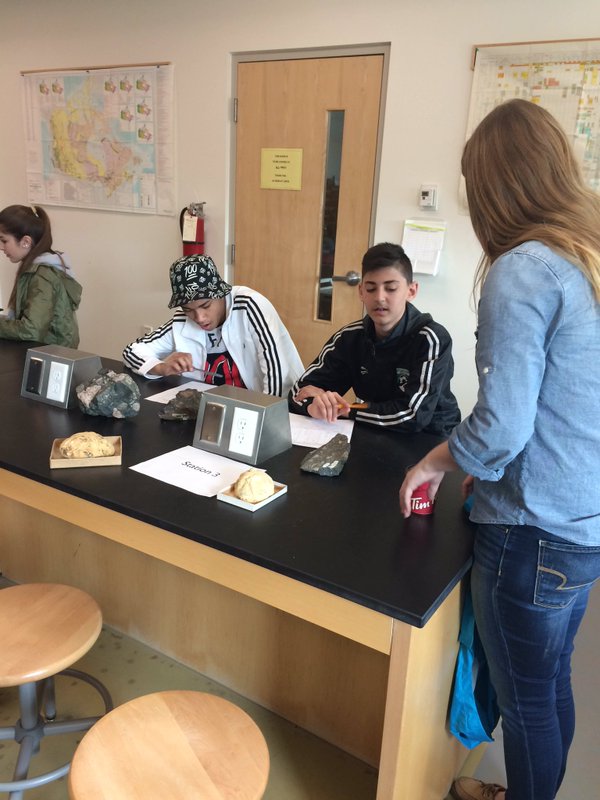
High School Workshops
McMaster researchers welcomed 70 area high school students, leading them on a hike through Cootes Paradise and inviting them into labs to learn more about local invertebrate species and water quality, as well as to examine rock samples that provide evidence of how the Earth’s climate has changed over time.
Big Ideas, Better Harbour
Climate Change and Environment: Navigating from Risk to Resilience wrapped up with a conversation on the future of Hamilton Harbour.
Big Ideas, Better Harbour featured academics, civic leaders, community activists and residents who came together to explore ways to support a healthy and thriving harbour. This event featured expert talks and a panel discussion moderated by Chris McLaughlin Executive Director of the Bay Area Restoration Council.
Speakers and panelists included, Chris Phillips, Senior Advisor to the General Manager of Planning & Economic Development at the City of Hamilton, Desirae Cronsberry from Steelcity Living, Jay Carter, Hamilton Project Manager at Evergreen Cityworks, and Rob Fiedler, an urban geographer and cartographer.
McMaster speakers included Ken Cruikshank, Dean of Humanities and Hamilton historian who spoke about the history of Hamilton’s harbor and Pat Chow Fraser, a professor in McMaster’s Department of Biology.
Conclusion
Big Ideas, Better Cities concluded in April 2016, drawing to a close a series of nearly 20 individual events that brought together researchers from more than 30 departments campus-wide.
Read McMaster’s strategic plan for community engagement, Working Together for an Inclusive, Sustainable Hamilton.
McMaster President Patrick Deane says he was deeply impressed with the scope and breadth of the events and says the series illustrated how universities and communities can come together to talk about, and address the significant challenges facing local communities, our country, and the world.
“McMaster committed a year to Big Ideas, Better Cities– a year in which we gained a deeper understanding of the critical issues affecting Hamilton and made important connections within our local and research communities,” says Deane. “We are proud to be a part of the Hamilton community. We look forward to continuing this dialogue with our community partners and strengthening the relationships that were formed throughout the course of this extraordinary series of campus-community events.”
Loading…


